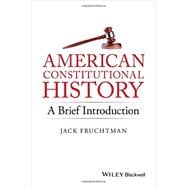- Presents readers with a brief and accessible introduction to more than two centuries of U.S. constitutional history
- Explores constitutional history chronologically, breaking U.S. history into five distinct periods
- Reveals the full sweep of constitutional changes through a focus on issues relating to economic developments, civil rights and civil liberties, and executive power
- Reflects the evolution of constitutional changes all the way up to the conclusion of the June 2015 Supreme Court term








